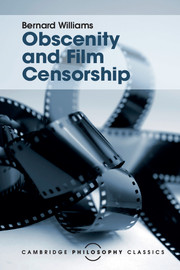Preface
Published online by Cambridge University Press: 05 November 2015
Summary
The Committee on Obscenity and Film Censorship, of which I was Chairman, was appointed in July 1977 by the then Home Secretary, the Rt Hon. Merlyn Rees, and reported in October 1979. This book is a reprint of our Report, originally published by HMSO (as Cmnd 7772) in 1979. It is unchanged except for the omission of eight appendices, on such matters as the history of the criminal law in these areas and of film censorship, the law in other countries, and bibliographical and statistical issues. We are grateful to the Home Office and to the Stationery Office for giving permission for this reprint.
A Departmental Committee of this kind, like a Royal Commission, ceases to exist after it has reported. Responsibility for this Preface cannot therefore be ascribed to the Committee. Still less, of course, can it rest in any way with the Home Office, and it must be simply my own.
There are other and more general effects of the fact that such a Committee ceases to exist. It cannot do anything collectively to influence or comment on its Report's reception. This is no doubt inevitable, but it can put the Committee and its Report at some disadvantage against its critics, who, particularly in the case of organisations and pressure groups, have (quite legitimately) continuing opportunities to comment on it.
It would be inappropriate for me to comment here on the reception of our Report or on criticisms which it has received. However, I can perhaps say something about the kind of Report it is, and what it tries to achieve. For reasons that we explain in Chapter 1, we did not think that this was a subject on which we could usefully commission or suggest new research. There is already a gigantic amount of research material on these subjects; much of it is admittedly not very helpful, but what would be needed to improve on it would be inspiration, not simply more labour or Departmental support. What we sought to do was to clarify the issues involved and to develop some shared understanding of such things as the nature of pornography, an understanding which we hoped would be at any rate rather less superficial than that often displayed in controversy.
- Type
- Chapter
- Information
- Obscenity and Film CensorshipAn Abridgement of the Williams Report, pp. xi - xivPublisher: Cambridge University PressPrint publication year: 2015

